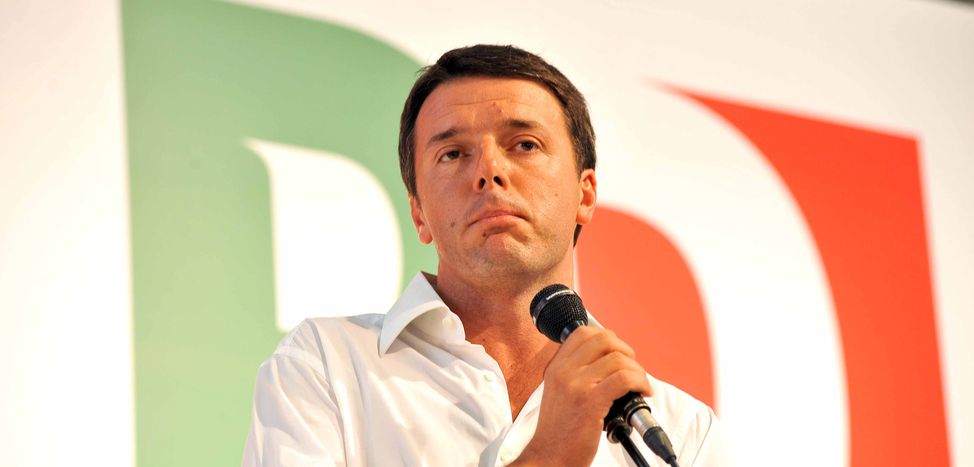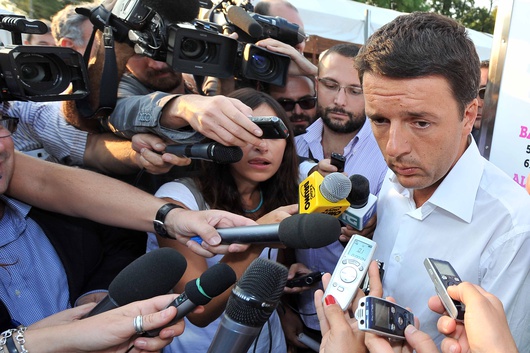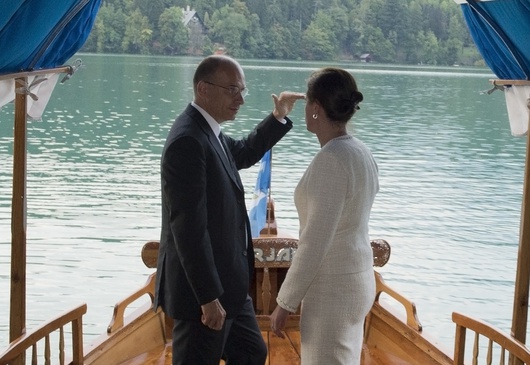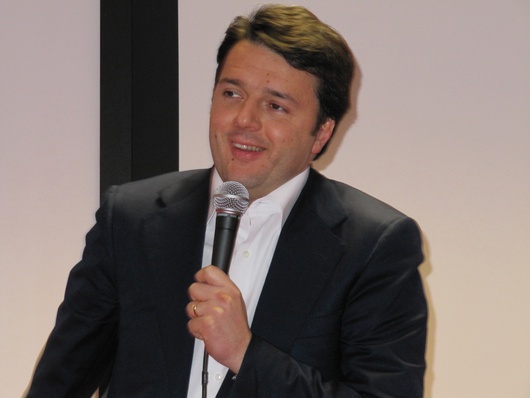
Renzi replaces letta as italian prime minister
Published on
After just ten months as prime minister, Enrico Letta is already out. In comes Matteo Renzi. He has inspired a vague sense of optimism, but this optimism overlooks the incovenient truth that, just like his two predecessors, Renzi was not elected by the Italian people. So who exactly is Italy's new Florentine leader unelect?
The American Scout Boys’ oath is enthusiastic, eager, and perhaps a little naive. "I will do my best to do my duty, to God and my country,” it says, and “to help other people at all times, to keep myself physically strong, mentally awake, and morally straight.” In an early episode of Happy Days, Fonzie, with similarly bright and determined rhetoric, announces: "You ain't nobody until you do what you want.” In both, the optimism is tangible. The drive is almost contagious. The self-assuredness and spirit of initiative are paired with a certain cockiness that one could find either endearing or insufferable. Anybody who embodied all these features would undoubtedly divide opinion and ignite debate.
 Conveniently, Italians – who excel at complaining – now have the man who matches said description perfectly. This Boy Scout - Fonzie hybrid is called Matteo Renzi, and on Monday he became Italy's new Prime Minister. Although a remarkable achievement in itself for the young mayor of Florence – a relatively small city – it should be noted that Italy has recently become renowned for her streak of unelected Prime Ministers whose job was to keep the country afloat until better economic times. Berlusconi stepped down from power during his fourth cabinet in November 2011, and since then the country has witnessed a steady flow of Heads of State: Mario Monti, the technocrat; Pierluigi Bersani, the Democratic Party leader who found himself in the eye of the storm after the inconclusive February 2013 elections; and Enrico Letta, who was asked to lead a shaky coalition government once Bersani bailed out. And now Renzi replaces Letta: the third Prime Minister in two and a half years who was not elected by the Italian people.
Conveniently, Italians – who excel at complaining – now have the man who matches said description perfectly. This Boy Scout - Fonzie hybrid is called Matteo Renzi, and on Monday he became Italy's new Prime Minister. Although a remarkable achievement in itself for the young mayor of Florence – a relatively small city – it should be noted that Italy has recently become renowned for her streak of unelected Prime Ministers whose job was to keep the country afloat until better economic times. Berlusconi stepped down from power during his fourth cabinet in November 2011, and since then the country has witnessed a steady flow of Heads of State: Mario Monti, the technocrat; Pierluigi Bersani, the Democratic Party leader who found himself in the eye of the storm after the inconclusive February 2013 elections; and Enrico Letta, who was asked to lead a shaky coalition government once Bersani bailed out. And now Renzi replaces Letta: the third Prime Minister in two and a half years who was not elected by the Italian people.
There are several things that differentiate Renzi from his predecessors. Two of them have become hackneyed through their incessant repetition by the media: yes, he is “young”, and yes, he is “ambitious”. At 39, he can already boast a successful career as President of the Province of Florence, Mayor of Florence, and Secretary of the Democratic Party – not to mention his phenomenal rise from a provincial position to that of most talked-about politician in the country. His name became associated with the Italian electorate’s exasperation following decades of political domination by the same senior politicians: in 2012, Renzi seemed uninterested in climbing the political ladder, focusing instead on the fight for renewal of the ruling class. Largely under the radar until then, he unsurprisingly lost the centre-left primary elections in December 2012. But, with hindsight, the defeat was a blessing: Renzi was widely praised for his graceful admission of defeat in a country where objection and criticism of practically anything are the norm. For some time, he went back to his beloved Florence, and resumed his light-hearted but frequent Facebook and Twitter activity.
 Fast forward to today. Renzi’s social media stream has died down in the past few weeks, but the Italian public let loose on all platforms as soon as he announced his desire to dethrone Letta. Sarcastic comments appeared alongside snippets of old interviews in which Renzi had declared his unwavering support for the Prime Minister; people dug out his previous assurances that he would never be Head of State. For some, Renzi has now shown his true face as a power-hungry vulture; for others, he has given proof of ambition and initiative at a critical time. Many more simply shake their heads, resigned, and waiting to see whether Renzi will last – or if the Italian Prime Minister’s seat is truly cursed.
Fast forward to today. Renzi’s social media stream has died down in the past few weeks, but the Italian public let loose on all platforms as soon as he announced his desire to dethrone Letta. Sarcastic comments appeared alongside snippets of old interviews in which Renzi had declared his unwavering support for the Prime Minister; people dug out his previous assurances that he would never be Head of State. For some, Renzi has now shown his true face as a power-hungry vulture; for others, he has given proof of ambition and initiative at a critical time. Many more simply shake their heads, resigned, and waiting to see whether Renzi will last – or if the Italian Prime Minister’s seat is truly cursed.
Renzi’s heart is probably in the right place. He is determined, energetic and undoubtedly confident that he will succeed where others have failed – in the task of preserving a delicate majority in Parliament, which he will have to share with Berlusconi’s former heir apparent, while changing several flawed laws and keeping the Italian economy afloat. The most common criticism that has been levelled at him is that his flowery rhetoric and catchy slogans will not help him govern a country that, right now, is outdoing herself in terms of rowdiness and chaos.
Indeed, it is true that Renzi will have to prove he is more than a pretentious Fonzie who charges headfirst towards his objectives, and that governing Italy will not cost him his health and morals - which is a very real risk for aspiring prime ministers. Just ask Berlusconi about the Bunga Bunga parties and the seedy trials, or ask Letta, who seems to have aged at record speed in the past six months.
Strangely, the chief argument of both his detractors and his supporters is one and the same: Renzi is a perfect product of his time. His cool, young, determined self might turn out to be as flimsy as his inspirational declarations and hashtags about “changing Italy together”: but, until now, it is precisely this fleeting vivacity that has attracted the attention of those who, like many of us, have a disturbingly short attention span, happy to skim through the day’s headlines, preferring sensational, superficial statements over any real substance. No one will be shocked if Renzi turns out to prioritise the surface over the contents. But many will be pleasantly surprised if it emerges that, in fact, not only can Renzi make his promises sound better than his predecessors, but that he can also translate into actions the enthusiasm and liveliness that got him where he is today.
supporters is one and the same: Renzi is a perfect product of his time. His cool, young, determined self might turn out to be as flimsy as his inspirational declarations and hashtags about “changing Italy together”: but, until now, it is precisely this fleeting vivacity that has attracted the attention of those who, like many of us, have a disturbingly short attention span, happy to skim through the day’s headlines, preferring sensational, superficial statements over any real substance. No one will be shocked if Renzi turns out to prioritise the surface over the contents. But many will be pleasantly surprised if it emerges that, in fact, not only can Renzi make his promises sound better than his predecessors, but that he can also translate into actions the enthusiasm and liveliness that got him where he is today.



